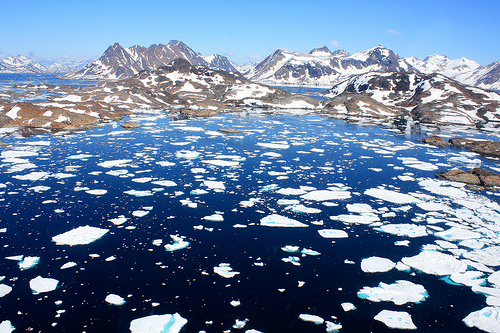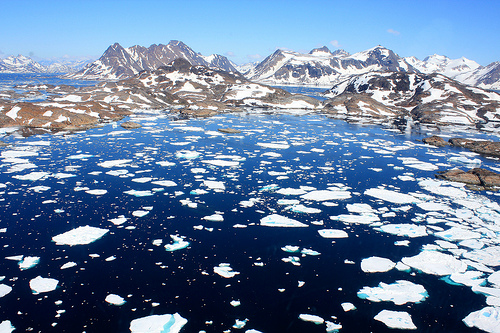 Next on Big Oil’s hit list: the Arctic. Photo courtesy chrissy575 via FlickrSure, deepwater drilling is on hold in the Gulf of Mexico, but it’s about to go into high gear in the Arctic.
Next on Big Oil’s hit list: the Arctic. Photo courtesy chrissy575 via FlickrSure, deepwater drilling is on hold in the Gulf of Mexico, but it’s about to go into high gear in the Arctic.
You know the drill: Last week, the Scottish company Cairn Energy announced that it had found natural gas deposits off the coast of Greenland, and right away there was talk of a new oil rush. As much as 20 percent of Earth’s untapped oil is thought to be in the Arctic, which is now more accessible than it’s ever because — Irony Alert! — so much of the polar ice has melted due to global warming caused by fossil fuels.
Within a week or so, Greenland’s government will grant licenses to explore along its coast — Shell, ExxonMobil, and Norway’s StatOil are reportedly chomping at the bit. Green groups are girding for an Arctic oil boom. Writing in NewEurope, Kostis Geropoulos quotes Jack Hunter, of Greenpeace’s European Union unit:
By drilling for oil in ever more dangerous, difficult to reach places the oil companies are taking us in the wrong direction. If a spill happened there, that pristine area would face an environmental catastrophe.
Gimme the Arctic … straight up!: Thanks to the polar meltdown, it’s now possible to circumnavigate the Arctic Ocean in ice-free waters, and that will probably be the case for at least another month. No, this is not normal. But as Jeff Masters points out in his WunderBlog, it is now. This is the third consecutive year that both the Northwest Passage and the Northeast Passage in the Arctic are passable, and the trend spells trouble to come:
When the summertime Arctic sea ice starts melting completely a few years or decades hence, the Arctic will warm rapidly, potentially leading to large releases of methane gas stored in permafrost and in undersea “methane ice” deposits. Methane is 20 to 25 times more potent than CO2 at warming the climate, meaning that the fire in Earth’s attic will inexorably spread to the rest of the globe.
Money can’t buy you love…not even Brad Pitt’s: One company that won’t be joining the Arctic drilling party is BP, which, for obvious reasons, Greenland sees as a political pariah. Speculation abounds as to whether BP will ever regain its reputation as a company that “lives on the frontiers of the energy industry.” BP, meanwhile, is busy trying to prop up any kind of reputation. To make sure we all get the message that it will “make things right” in the Gulf, BP has spent an average of $1 million a week on TV and radio ads since the Deepwater Horizon explosion in April, according to a report by James Quinn in The Telegraph. Oh, and speaking of “make it right,” Brad Pitt was the first to coin the phrase — for his push to rebuild home in New Orleans ravaged Ninth Ward post-Katrina. The actor called BP’s appropriation of his slogan “dastardly.”
The end (of the end) is near!: It’s looking more and more like the current freeze on deepwater drilling in the Gulf won’t last its full six months. Last week, a bipartisan think tank concluded that enough safety measures are in place for the moratorium to end before November 30. Now Bill Reilly, former head of the Environmental Protection Agency and co-chair of the White House commission investigating the Gulf gusher, agrees that the drilling ban should be lifted sooner rather than later.
They got it bad, and that ain’t good: That would be yet another setback for green groups desperately trying to stop the downward spiral of the past year. From the debacle in the Gulf to the disaster in the Senate, where climate change legislation shriveled like fruit left out in the sun. In a front page story in today’s Washington Post, David Fahrenthold writes about how enviros are struggling to salvage any kind of victory after overestimating the public’s passion for climate change legislation and underestimating Big Oil’s clout on Capitol Hill. David DiMartino, a spokesman for Clean Energy Works, told Fahrenthold:
The oil industry has tremendous reach and control in the United States Senate. Our mistake was miscalculating … how far into the Senate it went.
Better fed than dead: Here’s a little ray of sunshine. According to Joel Benenson, pollster for the Obama campaign, a recent survey still shows strong public support (60 percent) for having the federal government control greenhouse gas emissions. A slightly lower percentage of respondents (54 percent) feel confident the EPA can handle the job, and 53 percent oppose the proposal from Sen. Jay Rockefeller (D-W.Va.) to suspend the EPA’s authority to regulate greenhouse gases for two years.
And get this: Brazilian scientist Fernando Galembeck recently told a meeting of the American Chemical Society that he and his team of researchers have made progress in harvesting the electricity in thunderstorms. Galembeck said he was hopeful that one day this “hygroelectricity” could be captured by small rooftop devices.
Hey, it worked for Frankenstein.




